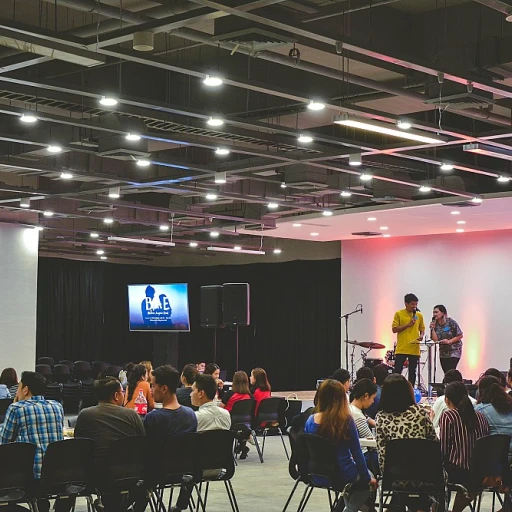
The Core Responsibilities of a Dean of Students
Key Duties and Responsibilities
The role of a Dean of Students is pivotal in shaping the student experience within a college or university. This position is primarily focused on fostering a supportive and inclusive environment that enhances student learning and development. The dean is responsible for overseeing student services and programs that contribute to the overall academic and personal growth of students.
On a daily basis, the dean works closely with faculty and staff to ensure that the policies and procedures align with the institution's mission and values. This involves collaborating with various departments to create a cohesive community that supports diversity, equity, and inclusion. The dean also plays a crucial role in addressing student concerns and providing guidance on academic and personal matters.
Building a Supportive Community
Creating a nurturing work environment for students is a core responsibility of the dean. This involves implementing programs that promote student leadership and engagement, as well as offering resources for professional development. By fostering a sense of belonging, the dean helps students thrive both academically and socially.
Moreover, the dean is tasked with ensuring that student support services are accessible and effective. This includes coordinating with student affairs professionals to address issues related to student well-being and campus life. The dean's efforts in building a supportive community are essential for enhancing the overall student experience.
Ensuring Effective Communication
Effective communication skills are vital for a Dean of Students, as they must convey important information to students, faculty, and staff. This involves not only disseminating policies and procedures but also actively listening to the concerns and feedback of the student body. By maintaining open lines of communication, the dean can better understand the needs of students and work towards addressing them.
For those interested in learning more about crafting thoughtful messages and enhancing communication within human resources, consider exploring thoughtful communication strategies.
Essential Skills for Effective Student Leadership
Key Skills for Leading Students Effectively
In the dynamic environment of student affairs, the dean of students plays a pivotal role in shaping the student experience and fostering a supportive community. To excel in this position, a dean must possess a diverse set of skills that enable them to navigate the complexities of academic and social life on campus.
First and foremost, strong leadership skills are essential. A dean must inspire and guide both students and faculty staff, ensuring that everyone works towards common goals. This involves not only setting a vision but also being able to adapt to the changing needs of the student body and the broader college community.
Communication skills are equally crucial. The ability to communicate effectively with students, faculty, and other departments is vital for implementing policies and procedures that support student development and learning. Clear communication helps in addressing student concerns and fostering an environment of equity and inclusion.
Another important skill is problem-solving. The dean often encounters challenges that require quick and effective solutions, whether related to student support services or campus-wide programs. This requires a deep understanding of the school’s policies and the ability to work collaboratively with other departments to find the best outcomes.
Moreover, a successful dean must have a strong grasp of diversity and inclusion principles. Creating an inclusive environment where all students feel valued and supported is a key responsibility. This involves actively promoting diversity equity and ensuring that all voices are heard and respected.
Finally, professional development is important for any dean looking to enhance their skills and stay updated with the latest trends in student affairs. Engaging in continuous learning opportunities and networking with peers can provide valuable insights and help improve the work environment for both students and faculty.
For those interested in understanding the broader context of job benefits and compensation in educational settings, exploring the differences between total job benefits and total employee compensation can provide additional insights.
Navigating Challenges in Student Affairs
Addressing the Complex Dynamics in Student Affairs
In the realm of student affairs, a dean of students is often faced with a host of complex challenges that require both strategic thinking and compassionate engagement. The primary focus is to support and enhance the student experience by fostering an inclusive community that promotes diversity and equity. To achieve this, understanding the various components that influence student development and learning is key.
Effective support systems are crafted to address the diverse needs of a college or campus environment. This involves implementing tailored programs and services designed to assist students from all backgrounds. For instance, services that focus on equity and inclusion are crucial in creating an environment where all students can thrive both academically and socially.
Navigating these challenges also demands strong communication skills. A dean must ensure that open lines of communication exist among faculty, staff, and students. It is critical to keep everyone informed about policies and procedures which, in turn, fosters a sense of safety and belonging. Additionally, leveraging resources such as HR communication strategies can significantly benefit the broader school community.
Building resilient leadership within student affairs also means collaborating effectively across different departments and with faculty members. Regular professional development opportunities for staff can help equip them with the necessary skills and ability to handle diverse situations effectively, while aligning with the institutional mission to optimize the student experience.
Ultimately, a dean’s role in navigating these challenges is integral to the overall success of the school or college. By prioritizing support, communication, and collaboration, they create a cohesive and nurturing environment conducive to both academic and personal student growth.
The Importance of Communication in Student Affairs
The Vital Role of Communication in Student Affairs
Communication skills are paramount in the realm of student affairs. A dean of students can effectively open lines of dialogue with students to better understand their needs and concerns. This facilitates more personalized support and enhances the student experience on campus.
Day-to-day interaction involves exchanging critical information with students, faculty, and other professionals across various departments. These interactions form the foundation for collaborative initiatives that directly support student growth and learning.
Transparent communication also plays a significant role in promoting equity and inclusion within the school community. By setting clear policies and procedures, the dean ensures that every student has equal access to programs and services, fostering a sense of belonging and community.
In addition to interdepartmental collaboration, a dean of students must effectively engage with faculty and staff. Building strong relationships helps in creating a positive work environment that bolsters academic and professional development through continuous feedback and guidance.
Moreover, the dean must continually refine their communication strategies to address the challenges that arise in a diverse and evolving student affairs landscape. By doing so, they maintain a dynamic approach in meeting the increasing complexity of duties and responsibilities in today's educational settings.
Collaboration with Other Departments
The Power of Departmental Synergy: Crafting a Cohesive Campus Community
Collaboration across departments is fundamental to enhancing the student experience and nurturing a supportive academic environment. A dean of students works in harmony with various departments to ensure that all aspects of student life are addressed efficiently, from academic services to student support programs.- Strengthen Student Support: Effective collaboration can boost student support initiatives, ensuring the diverse needs of the student body are met. Whether it's working with student services or academic programs, synergy helps tailor solutions for student well-being.
- Enhance Learning and Development Opportunities: By working closely with faculty and staff, initiatives aimed at leadership development and experiential learning can be optimized, supporting students' holistic growth.
- Integrate Equity and Inclusion: Working with departments focused on diversity, equity, and inclusion is crucial. Joint efforts can lead to significant strides in creating an equitable campus for all students.
- Facilitate Policies and Procedures: Communication across departmental lines ensures alignment in policies and procedures, contributing to a consistent and fair student experience. This alignment supports the dean students in fulfilling their duties and responsibilities seamlessly.
- Foster Professional Interactions: Regular interaction with other departments can enrich the professional development of the dean, enhancing skills in human resources, leadership, and communication. Building a robust network can be invaluable for addressing student-related challenges more effectively.
Career Path and Professional Development
Pathways for Growth and Development
The role of a Dean of Students offers an enriching career path with numerous opportunities for professional development. Those who embark on this journey often find themselves deeply engaged in fostering a supportive student community, enhancing student experience, and collaborating closely with other departments within the college or university.
To succeed and excel, it is crucial for a Dean of Students to continually refine their skills and abilities—particularly in areas such as leadership and communication skills, as highlighted in previous sections. This involves staying updated with the latest in student support services, understanding policies procedures, and actively participating in programs that focus on diversity equity and inclusion.
Ongoing Learning and Networking Opportunities
Participation in workshops, seminars, and conferences provides valuable opportunities for learning and networking. These events not only contribute to personal growth but also empower a Dean to implement new strategies and initiatives that enhance the academic and social environment on campus.
Moreover, engaging with faculty staff and taking advantage of mentorship programs can significantly impact one's professional journey. This form of collaboration leads to a well-rounded understanding of the intricate workings of student affairs, ultimately benefiting both the Dean and the students they serve.
Strategic Planning for Career Progression
Career progression in student affairs often involves aiming for positions that offer more comprehensive responsibilities, such as Vice President of Student Affairs or similar executive roles. Aspiring individuals need to focus on expanding their experience in areas such as equity inclusion initiatives, developing student programs, and refining their leadership skills.
To remain competitive in this field, it's essential to understand the broader context of higher education and align one's career goals with the institution's mission and vision. This strategic approach ensures sustained growth and contribution to the school's success.













